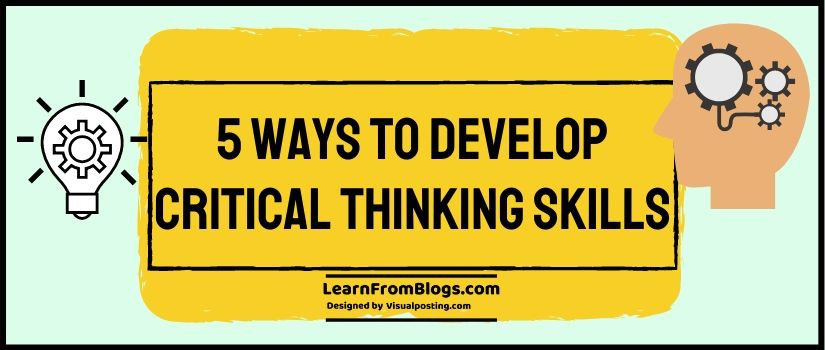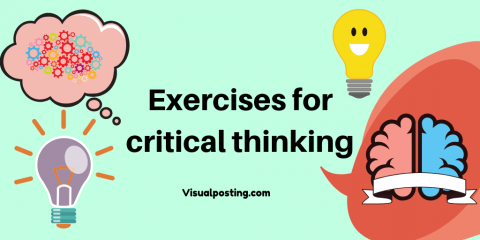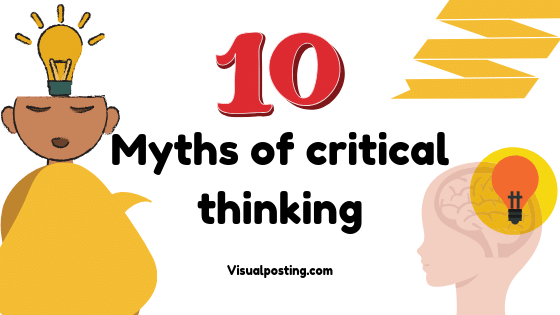
To develop the idea of critical thinking requires critical thinking. Well, this cannot be achieved by practice, because the thought process can never be practiced. Thoughts are just information, stored in the database of your subconscious mind. However, your wish can come true by making some regulations and habits. Thus, these are some ways to develop a critical mindset.
- OBSERVE CONSCIOUSLY.
We may observe things daily, but fail to do it consciously. Keeping all your books aside, have a walk in your nearby park. Sit there for some time and be conscious about the activities going around you. You may wonder this will help. Well, good things always need a fresh start. Doing this will generally rejuvenate your mind. Also try to observe how others communicate and, their different way of speaking. At least, analyze different strategies of perceiving things. Remember, there is a difference between sitting idle and observing. All you have to do is watch and store the data in your subconscious mind. This is the way of observing things.
- DEVELOP LISTENING SKILLS.
Listen before you speak. Consciously listening is probably the most vital element to develop an idea of critical thinking. Before approaching this idea, add information to your subconscious mind. Without any relevant information, it is quite impractical to approach towards the subject. You would be eager to speak but wait for your turn. Only then, it will be easy for you to perceive ideas. This habit of listening will lead you towards new innovative ideas and, perceive new thoughts. Besides, speaking before listening is a foul manner. This can be quite embarrassing for an elderly person, having communication with you. Relationships might also be affected if this habit continues to exist.
- A SMART FRIEND CIRCLE HELPS.
Choosing friends is an art. The people surrounding you drastically impact your way of critical thinking. Therefore, try to make a smarter friend-circle. Friendship is a fixed asset that is capable of either ruining you or building you. Having a smart friend will provide you an opportunity of learning from them. Furthermore, you will develop your communication skills. So, choose wisely and judge them according to the milestones they achieved in the past. To choose wisely, notice their habits. If they are associated with unsocial activities, immediately discard them from your life. Since they may compel you to do the same in the future.
- ASK QUESTIONS.
Asking questions is a phenomenal habit of the wise. The reason you ask a question is just that you do not know about that particular subject. Well, not knowing is better than half knowledge. History remains a genuine witness to why half-knowledge leads to destruction. If you are a student, don't hesitate to ask questions to your teacher. There is nothing to be ashamed of. Good teachers always feel proud of their students ask questions. This indicates that you are trying to grasp the concept. Furthermore, it would be excellent if you begin to generate your questions. Remember, making up a question needs more critical thinking than solving one. To take your level of thinking to a critical state, try solving your questions. This will help you develop a broader and critical mindset.
- STAY AWAY FROM INTOXICATION.
Intoxication is the biggest parasite that humanity is suffering from time immemorial. First, you have it and then, it starts having you. This social parasite feeds on human consciousness and health. No matter how much is your cerebral capacity, consuming this will not benefit you in any way. First, the victim experiences mental satisfaction and strength. However, this is not reality. Intoxicants act on your Central nervous system, thus making you unconscious about the activity going around you. This will deteriorate your present decision-making capabilities. Therefore, keep these foul habits at bay, if you want to develop critical thinking.
SYNOPSIS
Since you are in pursuit of establishing a critical mindset, you must pay no expense. This post won't be of any help, is there is no action involved. You must strictly abide by these conditions mentioned above. Remember, a critical mindset is important only in decision making. Still, it is better to live and enjoy life with a simple mindset. Life blossoms in that way. Depending upon the situation, one must use his capability of critical thinking. Your goal must not a critical mindset. A critical mindset is a consequence that is evolved by following the above instructions. Just follow these mentioned points and watch the difference.







Maria Bonita
Enhance your skills
How critical thinking is developed
Critical thinking is the process of applying logic in any situation or problem to find the proper solution. When you think critically, there is always a belief that later converts into claims. A belief can be either true or false, depending on the thinking of different persons.
Let us study an example. Some people believe that all ten persons will die if one person is not vaccinated. Now, it is a guarantee that all ten persons will die. So, it is the claim that both vaccinated and unvaccinated people will die is true. On the other hand, the ground belief is absolutely false.
Beliefs and claims in critical thinking
Critical thinking involves thinking using actual facts and figures. It has two things that are as under:
1. No claim or belief is 100% true even if scientists, experts, and mathematicians say so.
2. One must find out whether a particular thing is true or false.
A critical thinker looks at all the aspects carefully. He never accepts any claim or beliefs blindly.
Can critical thinking be negative?
There is a huge difference between critical thinking and negativity. Critical thinking is looking at every single detail and then deciding on your own way. It is the method that needs more research and understanding all the points to find out the truth. In other words, critical thinking is finding the truth and not accepting any belief or claim.
Negative thinking is assuming that only bad things will happen without any concrete evidence or proof.
Differences between claims and beliefs
1. Beliefs do not need proof while claims do.
Let us take an example. If you say that you believe in paranormal activities and ghosts, you are actually telling your beliefs. So, there is no need to show any proof. On the other hand, if you are trying to convince people that your beliefs are right, you must show proof.
2. Belief is not knowledge, but a claim is a knowledge.
When you believe something, it means that you hear it somewhere without concrete evidence. Belief does not give you knowledge because there is no guarantee of its authenticity. Other the other hand, the claims come from concrete proof, and it will give you knowledge.
3. Belief has no ownership, whereas claim has it.
Beliefs come from unknown sources, and no one says that he/she is responsible for that belief. People generally accept beliefs without knowing who said it. On the other hand, the claims come from a particular source. The person takes ownership of claiming something.
There is a thin line of difference in belief and claim that you must know while thinking critically. Critical thinking gives more importance to those beliefs that you can be taken as truth in the future. It looks at the evidence and not general beliefs.
If you want to become a better critical thinker, you must find the proof. You can then jump to a conclusion.
Finding Evidence
In any argument, one must show the proper evidence to support your statements. Critical thinking is one of the important tools to get the right conclusion. If you want to make others agree with your decision, you must have concrete evidence to explain the reasons. In other words, you must justify your opinion.
Finding evidence is a challenge, and you must accept it wholeheartedly to show your opinion. It is necessary to find proper evidence in the critical thinking process.
Critical thinking and decision making
Critical thinking is the method of applying facts and searching for evidence to conclude. It is necessary to think critically for the right decision-making. There is an interrelation between critical thinking and decision-making.
You can make your decision better with the method of critical thinking. Both methods require proper information and evidence.
How to find evidence for arguments?
The first step in showing your ideas is to present proper evidence that supports your arguments.
6 ways to find evidence for arguments
There are some ways by which you can find evidence for your opinion, views, and arguments.
1. Case studies
The case study is one of the best ways to explain to people what you actually want to prove. You can use tools like Google Scholar, wherein you will get case studies of every subject such as science, technology, and law.
You can understand the viewpoints and perspectives of the people who disagree with your decision. Apart from that, you can also study judgments and court cases. To know how to deal with people who have opposite opinions as that of yours.
2. Find additional information
When you see some information or data supporting a point, you should not choose it blindly. You should find additional information about the topic you want to prove. Finding more data will give you a complete idea, and you then get the right conclusion.
Further, you can talk to friends, relatives, or other people who support your point. They have similar thinking to yours, and that will help you to come with a better idea.
3. Pick the best evidence
The first thing you must do to support your point is to present the available data. You must find factual information about a topic as much as possible. Now again, there may be certain beliefs and things that people think opposite to that of yours.
You must find the facts that support your arguments. Finding information and evidence will give you an idea between the fact and beliefs. You can know how people changed the truth over time with beliefs.
4. Remove bad evidence
Every argument is supported by good and bad evidence. You must avoid bad evidence and false points. In an argument, there is information and misinterpretation, and you must learn to see the difference between both.
If you learn to see the misinterpretation in any argument, you can avoid bad evidence and win over people who disagree with you. Knowing fallacious arguments will keep you away from manipulative persons. This will boost your critical thinking, and you can find the most relevant evidence.
5. Talk to people who oppose you
Why do people respect critics a lot? It is because of the opposite perspective. It is important to think from the point of the opposite person. The best opinions are the ones that raise controversies. You must think why people have contrary thinking?
It is important to have a look at the viewpoints of all the people and then understand. You may get a better solution to every problem through such behavior.
6. Take the help of the internet
Google is the mother of information in the present times. You can get the solution to every problem from Google. All you can do is type the statement and hit search and get the ocean of facts on Google.
In addition to that, you can also get many sources that support your ideas, beliefs, and arguments. You can also read blogs and articles.
Conclusion
Winning in an argument is never easy without proper evidence or fact. You need to explain the world with concrete and perfect evidence of why you support a particular statement. It is then possible to gain respect and cooperation from employees, friends, and other people in any place.